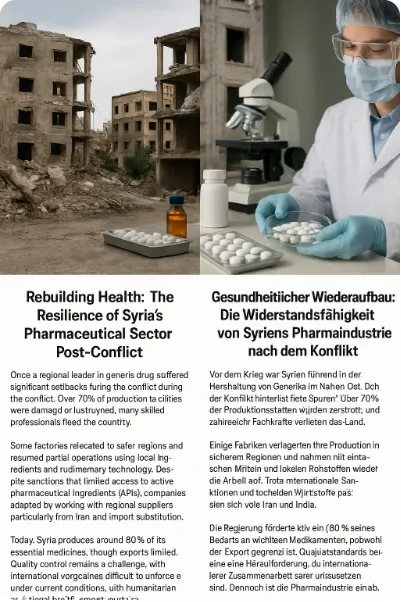
Sanctions and Supply Chains: Navigating the Global Pharma Landscape from Syria
Sanctions and Supply Chains: Navigating the Global Pharma Landscape from Syria

(English Version)
Syria’s pharmaceutical industry is entangled in a web of economic sanctions, supply chain disruption, and limited international engagement. Although medical supplies are officially exempt from most sanctions, financial and logistical barriers have restricted access to active pharmaceutical ingredients (APIs), lab equipment, and packaging materials.
Companies are turning to regional suppliers from countries like Iran, India, and China. However, these alternatives are not always reliable or compliant with international quality standards. The result is a fragile production environment that relies heavily on local improvisation and outdated manufacturing technologies.
Parallel imports and informal trade routes, including border exchanges with Iraq and Lebanon, have helped plug supply gaps. Still, this approach is unpredictable and risky, particularly when political tensions flare.
Despite these constraints, Syrian pharmaceutical firms have shown ingenuity. Some are producing raw materials locally, reformulating products, or repurposing old machines. Yet without global certification like GMP, exporting remains nearly impossible.
The industry’s future depends on easing trade restrictions, improving compliance capacity, and fostering collaboration with humanitarian agencies to ensure the availability of safe and effective medications.
Sanktionen und Lieferketten: Syriens Pharmaindustrie im globalen Kontext
(Deutsche Version)
Syriens Pharmaindustrie steht vor enormen Herausforderungen durch wirtschaftliche Sanktionen, unterbrochene Lieferketten und eingeschränkte internationale Zusammenarbeit. Obwohl medizinische Güter formal von Sanktionen ausgenommen sind, erschweren finanzielle Hürden und Logistikprobleme den Zugang zu Wirkstoffen, Labortechnik und Verpackungen.
Viele Unternehmen setzen auf Lieferanten aus Iran, Indien oder China. Doch diese Quellen sind oft unzuverlässig oder erfüllen keine internationalen Qualitätsstandards. Die Produktion bleibt dadurch fragil und abhängig von Improvisation und veralteter Technik.
Parallelimporte und informelle Handelsrouten, etwa über den Irak oder den Libanon, überbrücken zwar Versorgungsengpässe – jedoch mit Unsicherheiten und politischen Risiken.
Trotz aller Einschränkungen zeigt die Branche Kreativität: Einige Firmen stellen Wirkstoffe lokal her, formulieren Medikamente neu oder reaktivieren alte Maschinen. Ohne internationale Zertifizierungen wie GMP bleibt der Export jedoch fast unmöglich.
Eine nachhaltige Zukunft erfordert den Abbau von Handelsbarrieren, bessere Qualitätskontrollen und gezielte Partnerschaften mit humanitären Organisationen zur Sicherstellung der Medikamentenversorgung.